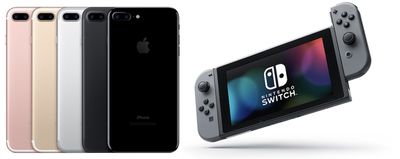A new article by The Wall Street Journal today has taken a look into the increased pressure put on suppliers of NAND flash memory units, as well as other smartphone components, and how Apple might be indirectly affecting the supply of the Nintendo Switch. According to people in the industry, smartphone makers -- namely Apple -- and their increasing ramp-up on component manufacturing for high-end devices have led to dwindling supplies of Nintendo Switch.
Specifically, Nintendo is lacking components related to NAND flash-memory chips, liquid-crystal displays, and the motors used in the Switch's HD Rumble feature. NAND memory chip supplies are said to be placed mainly upon the shoulders of Toshiba's struggling NAND chip unit, which is still up for sale despite legal troubles that have plagued the company over the past few weeks. In April, Apple was rumored to be looking into spending several billion for a "substantial stake" in Toshiba's NAND chip unit.

Apple's manufacturing ramp-up on the upcoming "iPhone 8" is said to be behind some of the supply chain constraints faced by Nintendo, as well as ongoing demand for the iPhone 7. Currently, Apple manufactures iPhone 7 with an LCD display and various internal sizes of NAND memory. The Nintendo Switch has a multi-touch LCD display and 32GB of internal memory.
People in the industry say the rapid expansion of web-based services for corporations has driven demand for computer servers that use flash memory. Continued demand for Apple’s iPhone 7 and a 10th anniversary model of the iPhone expected later this year are also keeping parts makers at full capacity, helping power Japan’s economy to its longest growth streak since 2006.
“Demand for our NAND flash memory has been overwhelmingly greater than supply, and the situation is likely to stay for the rest of this year,” said a spokeswoman at Toshiba Corp.
For Nintendo, the company has said it hopes to make as many as 20 million Switch units by the end of its financial year, in March 2018. Thanks to supply constraints, the actual sales target of the year is 10 million units, although "strong demand suggests it can sell many more - if it can make them." In its first month on the market, Nintendo sold 2.74 million Switch units.
Analysts watching the supply chain said that Nintendo's rivals "offer better terms" than the video game company, and that smartphone makers like Apple specifically "issue larger orders than Nintendo." This leads to manufacturers giving preference to companies other than Nintendo, and subsequent shortages for its products. Increased spending to secure more parts at a faster rate for the Switch isn't a possibility for Nintendo, as president Tatsumi Kimishima doesn't want the console's $299 retail price to increase.
























Top Rated Comments
Literally unthinkable back then. Crazy how times change.